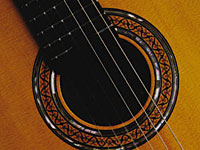|
||||||||||||||||||||||||||
| Music - MUSCA13931 | ||||||||||||||||||||||||||
This plan is only available to students commencing from 2009
The British Quality Assurance Agency for Higher Education Benchmark Statements for music note that music is one of the most diverse of degree types. This diversity is born partly of the reality that music is studied as a theory and a theoretically informed practice, and has a long and ‘charted’ history, which itself is a subject of study. The major in music seeks to examine music not only as a human intellectual product, but also as a specific reflection of experience, manifestation of culture and product of society. The disciplinary study of music has as a core the traditional methodology of Musicology.
The major in music enables students to develop their musicianship, musical skills and contextual understanding of music in preparation for professional work in music areas as diverse as broadcasting, recording, arts administration and advocacy, concert planning, music and general arts journalism. At the completion of the program, students will have broad expertise in at least one of the sub-disciplines of Musicology; a high level of practical skills in music cognition, analysis, and performance; and a high level generic graduate skills in the gathering, synthesis, criticism and presentation of information. The flexibility of the program allows for emphasis on: scholarly examination of musical repertoires, utilising both traditional and innovative methodologies; technologically based musicology, including the study of electronic music and psycho-acoustics; music aesthetics and criticism, both in historical overview and contemporary application; and music as social and cultural practice, through both historiographically and ethnographically informed study. Students will have a broad contextual knowledge that links to wider fields of historical, philosophical, cultural, and social study. A student who wishes to gain a major sequence in Music must complete 54 units of credit in approved core and elective courses. There are two possible major sequences.
The first possible major sequence is for students who have completed a minimum of HSC 2 unit music or extension, or AMEB 7th grade practical (pass) plus 5th grade theory or musicianship:
Level 1 Core courses
Level 2 Core Courses
Musicology and Musicianship electives
The second possible major sequence for students with less formal training in music is: Level 1 Core courses
Level 2
Core courses
Musicology and Musicianship electives
Musicology and Musicianship electives
BA students who have completed HSC Music 1 or who have AMEB or equivalent grades below 7th grade performance and 5th grade musicianship are encouraged to complete MUSC1001 (Music Fundamentals). Completion of this course at a required level provides the means of proceeding to a BA with a Major in Music, and may also provide, if combined with a satisfactory audition, a means for subsequent enrolment in the BMus, the BMus BEd, or the BMus BA.
Honours level study is also available in Music. A minimum of a credit average in Music courses throughout the program is a condition of entry to Honours.
Students interested in studying at Honours level should refer to the Honours plan record for a complete list of entry requirements. |
||||||||||||||||||||||||||



